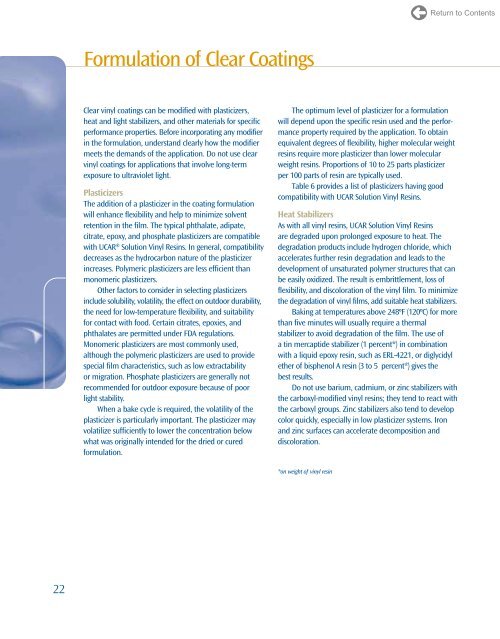Create successful ePaper yourself
Turn your PDF publications into a flip-book with our unique Google optimized e-Paper software.
22<br />
Formulation of Clear Coatings<br />
Clear vinyl coatings can be modified with plasticizers,<br />
heat and light stabilizers, and other materials for specific<br />
performance properties. Before incorporating any modifier<br />
in the formulation, understand clearly how the modifier<br />
meets the demands of the application. Do not use clear<br />
vinyl coatings for applications that involve long-term<br />
exposure to ultraviolet light.<br />
Plasticizers<br />
The addition of a plasticizer in the coating formulation<br />
will enhance flexibility and help to minimize solvent<br />
retention in the film. The typical phthalate, adipate,<br />
citrate, epoxy, and phosphate plasticizers are compatible<br />
with UCAR® Solution <strong>Vinyl</strong> <strong>Resins</strong>. In general, compatibility<br />
decreases as the hydrocarbon nature of the plasticizer<br />
increases. Polymeric plasticizers are less efficient than<br />
monomeric plasticizers.<br />
Other factors to consider in selecting plasticizers<br />
include solubility, volatility, the effect on outdoor durability,<br />
the need for low-temperature flexibility, and suitability<br />
for contact with food. Certain citrates, epoxies, and<br />
phthalates are permitted under FDA regulations.<br />
Monomeric plasticizers are most commonly used,<br />
although the polymeric plasticizers are used to provide<br />
special film characteristics, such as low extractability<br />
or migration. Phosphate plasticizers are generally not<br />
recommended for outdoor exposure because of poor<br />
light stability.<br />
When a bake cycle is required, the volatility of the<br />
plasticizer is particularly important. The plasticizer may<br />
volatilize sufficiently to lower the concentration below<br />
what was originally intended for the dried or cured<br />
formulation.<br />
The optimum level of plasticizer for a formulation<br />
will depend upon the specific resin used and the performance<br />
property required by the application. To obtain<br />
equivalent degrees of flexibility, higher molecular weight<br />
resins require more plasticizer than lower molecular<br />
weight resins. Proportions of 10 to 25 parts plasticizer<br />
per 100 parts of resin are typically used.<br />
Table 6 provides a list of plasticizers having good<br />
compatibility with UCAR Solution <strong>Vinyl</strong> <strong>Resins</strong>.<br />
Heat Stabilizers<br />
As with all vinyl resins, UCAR Solution <strong>Vinyl</strong> <strong>Resins</strong><br />
are degraded upon prolonged exposure to heat. The<br />
degradation products include hydrogen chloride, which<br />
accelerates further resin degradation and leads to the<br />
development of unsaturated polymer structures that can<br />
be easily oxidized. The result is embrittlement, loss of<br />
flexibility, and discoloration of the vinyl film. To minimize<br />
the degradation of vinyl films, add suitable heat stabilizers.<br />
Baking at temperatures above 248ºF (120ºC) for more<br />
than five minutes will usually require a thermal<br />
stabilizer to avoid degradation of the film. The use of<br />
a tin mercaptide stabilizer (1 percent*) in combination<br />
with a liquid epoxy resin, such as ERL-4221, or diglycidyl<br />
ether of bisphenol A resin (3 to 5 percent*) gives the<br />
best results.<br />
Do not use barium, cadmium, or zinc stabilizers with<br />
the carboxyl-modified vinyl resins; they tend to react with<br />
the carboxyl groups. Zinc stabilizers also tend to develop<br />
color quickly, especially in low plasticizer systems. Iron<br />
and zinc surfaces can accelerate decomposition and<br />
discoloration.<br />
*on weight of vinyl resin


